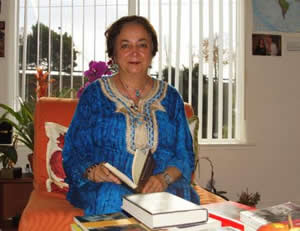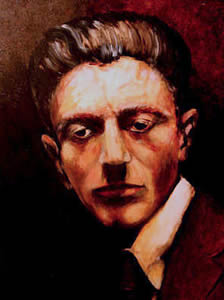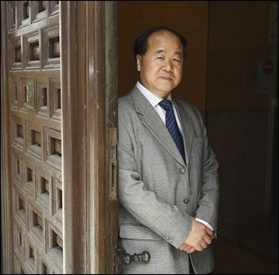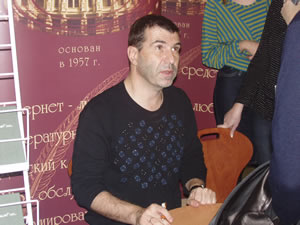|
De Iraanse schrijfster Shahrnush Parsipur werd geboren op 17 februari 1946 in Teheran. Zie ook alle tags voor Shahrnush Parsipur op dit blog.
Uit: The Gentlemen (Vertaald door Farzin Yazdanfar)
There were three gentlemen: Mr. Tahmooresi, Mr. Habibi, and Mr. Nemati. They were sitting on a patio covered with an old rug. The evening was rather long and the sun was on the edge of the roof. Mr. Tahmooresi, half-drunk, was looking at the rain spots on the wall and at the sun which was setting on the ledge. Mr. Nemati, cheerful, was whispering a popular song.
Mr. Habibi: She has a good heart. Yes, she's very sincere.
Mr. Nemati: There's something attractive in her voice. A strain of sadness! Her voice is unusually sad.
Mr. Habibi: They say that she has had a tragic life, too. Her aunt raised her after she had tragically lost her parents.
Mr. Nemati: How strange!
Mr. Tahmooresi: You guys are talking too much.
"So what do you want us to do?" The other gentlemen asked.
Mr. Tahmooresi: Keep quiet for a moment and look at the beauties of nature.
Mr. Nemati and Mr. Habibi looked at what Mr. Tahmooresi had called nature: An incongruous polygonal pond with two rectangular flower- beds on each side. The violets had withered, and Mrs. Tahmooresi had not gotten a chance to plant summer flowers. They had sprinkled water on the mosaic tiles, and steam rising from the wet tiles had made the air in the backyard swelter.
Mr. Nemati: What do you mean 'nature', Tahmooresi?
Mr. Tahmooresi: Don't try to split hairs. This is nature. Isn't this?"
Mr. Habibi: Of course! You told us to look at nature and we would like to know what you mean by nature.
Mr. Nemati: I know. He means this pine tree, these violets, this blackberry tree. Am I right Tahmooresi?
Mr. Tahmooresi: I think you don't understand what I'm saying. I mean something different. Perhaps the word 'nature' isn't quite the right word. I should look for a different word. Look around carefully. This is what I meant: you shouldn't talk too much; you should look instead.

Shahrnush Parsipur (Teheran, 17 februari 1946)
De Iraanse schrijver Sadegh Hedayat werd geboren op 17 februari 1903 in Teheran. Zie ook mijn blog van 17 februari 2010 en ook mijn blog van 17 februari 2011.
Uit: The Elixir of Life (Vertaald door Kambiz Parsai)
Once upon a time, there lived a cobbler who had three sons: the humpback Hasani, the baldhead Hosseini, and Ahmadak*. Hasani, the eldest son, was a juggler and a writer of amulets and deviser of talismans. Hosseini, the middle son, was a jack of all trades and none. Sometimes he would clean ponds and sometimes shovel snow off the roofs, but most of the time he was just a vagrant. Ahmadak,.the youngest son, was a considerate, helpful and obedient son for his father and, naturally enough, his favourite. He would work at herbalist shop and at the end of each month would bring his earnings to his father for the family. Unlike Ahmadak, his incapable brothers not only did not contribute anything, but also robbed the father of his earnings. They hated Ahmadak and were very jealous of him.
It so happened that the city they lived in, fell prey to a big famine. Conditions became gradually pressing and unbearable. One day the father summoned the three sons and said: You know what sons? The truth is that my business is dull beyond any hope and the dearth is increasingly pressing. You are grown-ups now and the youngest of you, Ahmadak, is fifteen. You must stand on your own feet, find or create a business for yourself and earn your own living. Leave my house and go your own way. May God be with you. As for me, Ill manage to eke out a modest living just to keep alive. If
someday your businesses thrived and you prospered, so much the better. Inform me too.
If you did your best and still failed, come back to me. Ill share my small loaf of bread with you.

Sadegh Hedayat (17 februari 1903 9 april 1951)
De Chinese schrijver Mo Yan werd geboren op 17 februari 1955 in Gaomi in de provincie Shandong. Zie ook mijn blog van 17 februari 2009 en ook mijn blog van 17 februari 2010 en ook mijn blog van 17 februari 2011.
Uit: Change (Vertaald door Howard Goldblatt)
In the fall of 1973, I found temporary work in a cotton processing plant where my uncle was an accountant. Temporary it might have been but, every month, after turning twenty-four yuan over to the production team, I took home fifteen. Back then, with pork selling for seventy cents a catty and eggs at six cents apiece, fifteen yuan went a long way. I began to dress smartly, wore my hair long and owned several pairs of white gloves. All that wealth sort of turned my head. One day, after I got off work, He Zhiwu came to see me. He was wearing worn out shoes with holes in the toes and a folded blanket over his shoulders. His hair was a mess, he hadnt shaved in a long time and there were three deep creases in his forehead. Lend me ten yuan, he said. I am heading up north. What about your family, whatll they do after you leave? The Communist Party wont let them starve, he said. Whatll you do up there? Dont know. But its better than hanging around here till I die, dont you think? Look at me, Im damn near thirty and I dont even have a wife. I have to get out of here. Moving kills trees, but it keeps people alive. To tell the truth, I didnt want to lend him the ten yuan, a tidy sum in those days. Hows this? he said. If I make good I wont pay you back, but if I dont Ill pay you back if I have to sell my blood to do it. I couldnt make heads or tails of this logic, and hemmed and hawed for a while before finally lending him the money.

Mo Yan (Gaomi, 17 februari 1955)
De Russische schrijver, regisseur en acteur Yevgeni Grishkovetz werd geboren op 17 februari 1969 in Kemerovo. Zie ook mijn blog van 17 februari 2009 en ook mijn blog van 17 februari 2010 en ook mijn blog van 17 februari 2011.
Uit: Flüsse (Vertaald door Beate Rausch)
"Ich verstehe nicht, und weiß nicht, wie man auf dem Dorf leben kann. Mir erscheint das Leben auf dem Dorf unerträglich schwer, vor allem grundlos schwer. Diese Sonnenauf- und Sonnenuntergänge, schneeweißer Nebel über dem Fluss, der einen heißen Tag ankündigt, aus diesem Nebel heraus das Brummen eines Motorboots, man hält die Angel in der Hand, und hinter einem muht, klappert, kräht das Dorf ... All das erfreut lediglich den fürs Wochenende angereisten Stadtmenschen ..."
(
)
"Auf einmal möchte der Pole oder Ungar, ganz zu schweigen vom Belgier oder Österreicher, der mit dem Gefühl nach Sibirien gekommen ist, gewissermaßen von der gesicherten Höhe der Zivilisation herabgestiegen zu sein, gar nicht mehr so dringend nach Hause zurückkehren. Na klar! Wo sonst auf der Welt geht an einem einzigen Abend dermaßen die Post ab? Wo sonst wird man ihn über alles und jedes ausfragen, sich so brennend für seine Meinung interessieren und ihm so aufmerksam zuhören? Wo sonst wird man ihm so oft und bedeutungsvoll die Hand drücken? Wann sonst wird er so viele, ihm nicht ganz verständliche Trinksprüche zu seinen Ehren zu hören bekommen? Wo sonst wird man aus irgendeinem Anlass seinetwegen ein solche Festmahl auftischen und so viel Wodka trinken? ..."

Yevgeni Grishkovetz (Kemerovo, 17 februari 1969)
Zie voor nog meer schrijvers van de 17e februari ook mijn vorige blog van vandaag
17-02-2012 om 20:18
geschreven door Romenu 
Tags:Shahrnush Parsipur, Sadegh Hedayat, Mo Yan,Yevgeni Grishkovetz, Romenu
|

